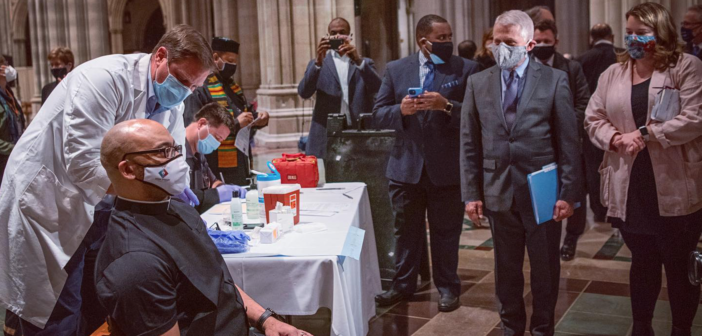Asa J. Lee of Wesley Theological Seminary shares key learnings from a recent event at the Washington National Cathedral which highlighted the critical role churches can play in encouraging vaccinations and fighting the coronavirus.
The Washington National Cathedral recently partnered with the nation’s top health agencies to host an event focused on the important role churches and religious organizations play in encouraging vaccinations against the COVID-19 virus. Well-known experts such as Dr. Anthony Fauci and Dr. Francis Collins spoke about the importance of strengthening the relationship between religion and science to expand awareness of the vaccine. The event highlighted a number of ways clergy and congregations can help fight the coronavirus pandemic in their communities.
1. Like primary care doctors, many clergy are trusted voices within their communities.
The credibility of clergy leaders is still quite high, especially among people of faith. It is, therefore, important for pastoral leaders to stay informed about the scientific rationales for the vaccination, COVID-19 safety protocols, and other relevant information for the sake of their communities. An informed approach means that clergy can use their credibility to speak to congregants and community members about getting vaccinated and staying safe.
2. Churches can be a vital link between government-led vaccine efforts and neighborhoods.
Federal and state officials have set up much of the logistical framework for vaccine distributions. But churches can play a critical role in connecting people with shots by hosting vaccination center sites or serving as information hubs in partnership with local public health departments. Melissa Rogers of the White House Office of Faith-Based and Neighborhood Partnerships says churches can help make sure that vaccines make it “the last mile” within local communities.
3. Religious communities often have efficient communication networks.
Congregants and clergy alike know the ubiquitous nature of “CNN” — the Church News Network. Information, whether verified or rumor, often travels through congregations rapidly. However, this amorphous system of relationships, phone numbers, and emails can be an important and highly effective way to counter misinformation around the COVID-19 virus and myths surrounding vaccinations. Churches can use their formal and informal communication systems to connect people to vaccines and encourage people who have been vaccinated to share their testimonies with those who are hesitant. And clergy can fuel the church talk with verified information regarding the vaccine and COVID-19 fighting protocols.
4. Church space and resources can be used in support of the vaccine distribution process.
Shuttered since last March, the National Cathedral has had no public events for a year, and its vast and gorgeous worship space has remained dormant. However, for this event, they set up tables and chairs, decorated the space with an art installation, and invited health officials from all around the DC Metro area to provide vaccinations to participants who needed them. The Cathedral’s event served as a template for church and public health partnership in vaccine distribution. Our sanctuary spaces and fellowship halls are large enough to accommodate health teams and table for vaccinations. That’s exactly how the Cathedral’s nave was used. Consider how your church’s space and resources may be of help to the vaccination effort.
5. Clergy and religious communities can advocate for underserved populations.
Churches that are engaged within their communities are often in regular contact with underserved populations overlooked by big initiatives like the vaccine rollout. The media has highlighted the many disparities in vaccine access related to factors such as race, wealth, education, and geography. Churches can play a part in both advocating for greater access and bridging the gaps for the most vulnerable. Because churches are links between government and neighborhood, they should not overlook their role as advocates for the least and lost.
We still have a long way to go in fighting the pandemic and restoring our collective health. But faith communities and faith leaders are critical partners in taking the fight “to the streets”. Think about your role in spreading the word in your community and how you may be able to lend your voice to vaccination efforts.
Related Resources
- What Will Your Church Look Like Post-COVID-19? by Barry Winders
- Ministering with Families in the Ongoing Pandemic by Emily Peck-McClain
- Why Reopening a Church is Different by Alex Shanks







